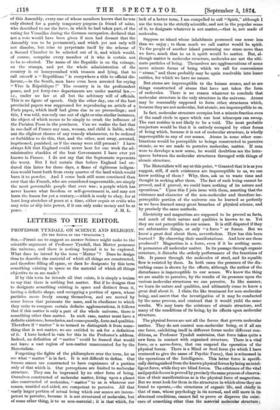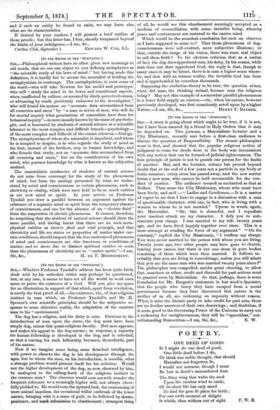LETTERS TO THE EDITOR.
PROFESSOR TYNDALL ON SCIENCE AND RELIGION.
[To TUE EDITOR OF THE "SPECTATOR."] Sm,—Permit me to suggest an answer Science might make to the scientific argument of Professor Tyndall, that Matter possesses the universe, and there is nothing beyond it to be explored. What does he intend by the term " Matter "? Does he design thus to describe the material of which all things are constructed, and therefore fllling all space, or does he designate by this term something existing in space as the material of which all things objective to us are made?
If by this term he intends all that exists, it is simply a truism to say that there is nothing but matter. But if he designs thus to designate something existing in space and distinct from it, having a definite shape, and occupying a portion of space, whose particles move freely among themselves, and are moved by some forces that permeate the mass, and in obedience to which they unite to compose certain definite agglomerations, it follows that if this matter is only a part of the whole universe, there is something other than matter. In such case, matter must have a definite existence, boundaries, and consequently, form and qualities. Therefore if " matter " is so termed to distinguish it from some- thing that is not matter, we are entitled to ask for a definition of it. I have looked in vain for this in the Professor's address. Indeed, no definition of " matter " could be framed that would not leave a vast region of non-matter unaccounted for by the Materialists.
Forgetting the fights of the philosophers over the term, let us see what " matter " is in fact. It is not difficult to define. Our human senses are constructed to have cognisance of a portion only of that which is. Our perceptions are limited to molecular structure. They can be impressed by no other form of being. Ourselves constructed of molecular matter, living upon a planet also constructed of molecules, " matter " to us is whatever our senses, unaided and aided, are competent to perceive. All that ' vastly larger portion of actual being which our senses are incom- petent to perceive, because it is not structured of molecules, but of some other thing, is to us non-material ; it is that which, for lack of a better term, I am compelled to call "Spirit," although I use the term in the strictly scientific, and not in the popular sense of it, to designate whatever is not matter,—that is, not made of molecules.
Suppose an island whose inhabitants possessed one sense less than we enjoy ; to them much we call matter would be spirit.
To the people of another island possessing one sense more than we have, much that to us is spirit would be matter. But, al- though matter is molecular structure, molecules are not the ulti- mate particles of being. Themselves are agglomerations of some more minute forms of being which we call for convenience "atoms," and these probably may be again resolvable into leaser entities, for which we have no names.
But atoms are imperceptible to the human senses, and so are things constructed of atoms that have not taken the form of molecules. There is no reason whatever to conclude that molecular structure is the only structure in the universe. Atoms may be reasonably supposed to form othe4 structures which, because they are not molecular, but atomic, are imperceptible to us.
In fact, molecular structure occupies but a minute fraction even of the small circle in space which our best telescopes can sweep.
The vast residue is not likely to be a void. The most probable conjecture would be that it is entirely occupied by other forms of being which, because it is not of molecular structure, is wholly imperceptible to any of our senses. Atoms in some other com- binations would be perceptible to beings constructed to perceive atomic, as we are made to perceive molecular, matter. If man were to develope a new sense, he would doubtless see the inter- spaces between the molecular structures thronged with things of atomic structure.
The Materialists will say at this point, "Granted that it is as you suggest, still, if such existences are imperceptible to us, we can know nothing of them? Why, then, ask us to waste time and thought in seeking after them. The fact of such being cannot be proved, and if proved, we could learn nothing of its nature and operations." Upon this I join issue with them, asserting that the existence and character of the non-molecular and therefore im- perceptible portion of the universe can be learned as perfectly as we have learned many great branches of physical science, and by precisely the same methods.
Electricity and magnetism are supposed to be proved as facts, and much of their nature and qualities is known to us. Yet they are not perceptible to our senses. It is still disputed if they are substantive things, or only "a force" or forces. But we know a great deal about them, nevertheless. Ilew has this been learned ? By observing their manifestations. And how are these produced? Magnetism is a force, even if it be nothing more. It permeates all molecular matter. In its passage through organic structure, it disturbs the orderly performance of the functions of life. It passes through the molecules of steel, and its equable flow is resisted by them. In both cases the presence of the dis- turbing cause is shown by the effects, although the author of the disturbance is imperceptible to our senses. We know the thing we are unable to perceive, by the results of its presence upon the
various Molecular structures we can perceive; In like manner,
we learn its nature and qualities, and ultimately come to know a great deal about it. I claim the like treatment for non-molecular being, and assert that the investigation of it may be conducted by the same process, and contend that it would yield the same results. We may learn the existence of atomic structure, and many of the conditions of its being, by its effects upon molecular structure.
The physical forces are not all the forces that govern molecular matter. They do not control non-molecular being, or if all are one force, exhibiting itself in different forms under different con- ditions, as Professor Tyndall maintains, that force takes quite a new form in contact with organised structure. There is a vital force, or a nerve-force, that can suspend the operation of the physical forces. There is a Mind or Soul force (to which I have ventured to give the name of Psychic Force), that is witnessed in the operations of the Intelligence. This latter force is specifi- cally distinguished from the known physical forces by being an intel- ligent force, while they are blind forces. The existence of the vital
andpsychic fc-sces is proved by precisely the same process of observa-
tion of their manifestations as is the physical force of magnetism. But we must look for them in the structures in which alone they are found to operate,—the structures of organic life, and chiefly in that of man, whose psychology in its normal, and stall more in its abnormal conditions, cannot fail to prove or disprove the exist- ence of something other than the material molecular structure; and if such an entity be found to exist, we may learn also what are its characteristics.
If desired by your readers, I will present a brief outline of these proofs ; but this letter has. I fear, already trespassed beyond the limits of your indulgence.—I am, &c.,































 Previous page
Previous page